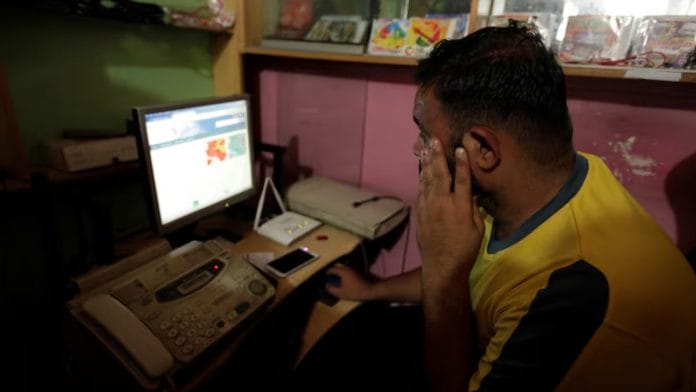New Delhi: Pakistan’s ongoing internet woes have entered a new phase: slow speeds and widespread disruptions. Last week, parts of Pakistan faced significant internet slowdowns, with disruptions affecting major cities like Rawalpindi, Islamabad, Karachi, and Lahore, Dawn reported.
These outages, reported by both users and telecom operators, were said to be a result of network overloads. However, the situation escalated as thousands of supporters of the Pakistan Tehreek-e-Insaf (PTI) party converged near Islamabad and authorities took precautionary measures, limiting internet access in some areas, which affected essential services.
“These disruptions are facilitating a brain drain of young talented individuals from Pakistan who are competing with other global professionals. Their clients cannot rely on them having uninterrupted access to the internet,” tech and human rights lawyer Omer Malik told ThePrint.
Pakistan’s internet speeds are significantly slower than the global average. Broadband speeds in the country are in the 10–20 Mbps range while the global average is 60–120 Mbps. In 2024, Faisalabad had the fastest fixed download speed at 22.01 Mbps, while Rawalpindi had the slowest at 16.87 Mbps.
Mobile network speeds, such as those from network provider Jazz, peaked at 11.5 Mbps in 2023. Despite having over 180 ISPs offering high-speed plans, Pakistan ranks 101 globally for internet speeds, while India and China rank much higher (20th and 13th, respectively), a 2024 report on the Global Speedtest Index by Ookla highlighted.
The situation was further complicated by the ongoing upgradation of Pakistan’s Web Management System—a firewall that monitors and controls internet traffic, a claim that the Pakistan Telecommunication Authority (PTA) denied. However, the lack of transparency has raised concerns and suspicions.
Failing digital economy
The economic impact of these disruptions is significant. According to the Pakistan Software Houses Association (P@SHA), the ongoing internet bans and disruptions could cost the country up to $300 million in losses.
A Statista report stated that in 2023, Pakistan’s economy suffered a staggering loss of over $7.7 million due to internet shutdowns, totalling $237.6 million in economic damage and impacting nearly 83 million people. The total duration of these shutdowns was 259 hours and Pakistan ranked 7th on the global list of countries most affected by internet shutdowns in terms of monetary losses during the past year.
Malik added that Pakistan has a vast user base, which presents an opportunity for entrepreneurs and tech innovators. Without reliable internet access, however, the dream of a thriving digital economy may not be functional.
Startups and small businesses in the tech space are particularly vulnerable, unable to operate effectively without stable connections. Furthermore, the disruptions drive away talent and investors, fueling a worrying brain drain as young, tech-savvy professionals seek opportunities abroad where reliable internet is a given.
Also read: How an Indian historian and Pakistani YouTuber reunited a family torn apart by Partition
Year-long bans, blame games
Internet shutdowns in Pakistan are not a new phenomenon.
The country has seen intermittent network disruptions since mid-2023, particularly following the arrest of former Prime Minister and PTI leader Imran Khan. The restrictions are often linked to security concerns, though critics argue they serve a more political purpose, with many suggesting that the government is trying to stifle dissent and limit opposition voices. Human rights organisations such as Amnesty and HRCP, too, have taken notice.
“These bans are blows to the structure of the rule of law in Pakistan and reduce its estimation as a constitutional democracy,” Malik said. The situation is further exacerbated by the government’s arbitrary bans on social media platforms like X. These bans have been justified on vague claims of national security threats, but experts point out that they also infringe on the right to free speech.
Ironically, the year-long ban on X has not been entirely effective, with many citizens bypassing it using VPNs. Even federal government officials use X, despite the ban.
“Maybe that is the only positive long-term effect. Try as they might, authoritative elements behind the ban have to face the reality that a rising tide cannot be reversed. The internet is here to stay and whatever their reasons to ban X, those goals remain unfulfilled,” Malik said.
(Edited by Prasanna Bachchhav)






